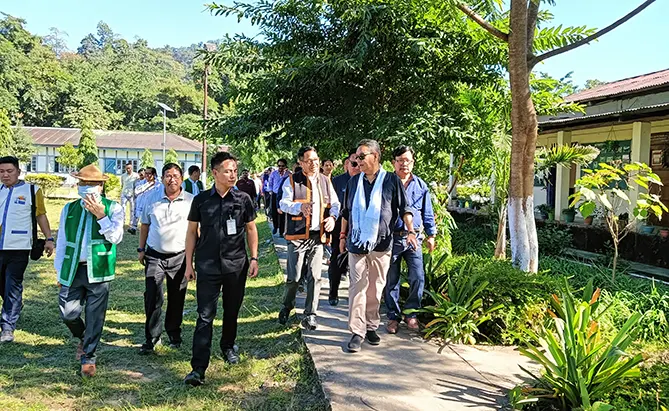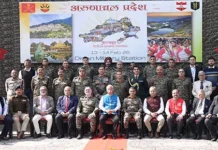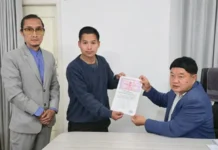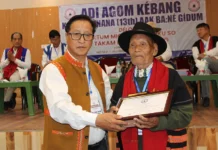LIKABALI, 9 Nov: Education Minister Passang Dorjee Sona reviewed the follow-up initiatives being undertaken in Lower Siang district in connection with the chintan shivir-cum-education conclave which had been held in August this year.
Sona said that the follow-up interaction meeting was convened for gearing up the initiatives being undertaken and clear misgivings and misconceptions of the people, and also to give it a final shape by preparing a database to formulate the education policy of the state.
Addressing the apprehension among the locals over losing their village schools amid the closing down of schools with less and zero enrollment and clubbing them together and running them in a suitable school with better facilities and human resource, he said that “the advantages our children are going to reap will be something they will be rejoicing one day.”
“The crunch of quality in our education is due to poor management of the system, which needs to be checked and put back to track. The curricula of our root of education, that is, the elementary level of education, should be robust and scientifically planned and designed to meet the present day requirement,” the minister said.
The minister inspected a few schools in the morning and interacted with the teachers. He said that the efforts of the government would be futile unless the teachers contribute sincerely.
“The onus is on the teachers at the ground level to make the target achieved,” the minister said.
Sona said that he envisions a policy with robust modalities to set the things in the right perspective and set a practical roadmap to revamp the education system of the state.
“The task before the government is arduous and people may not appreciate it at first instance as they are adapted to the old system, but the advantages of the initiatives overweigh their emotional attachment with their village schools, which are likely to be closed down,” he said.
Sona said that the conclave was held to find out the best alternatives and a roadmap and also to garner support and receive inputs from the elected members, CBOs, NGOs, student unions, bureaucrats, educationists and all other stakeholders to ensure that the commitment made by the ministry could be given a result-oriented final shape.
Education Secretary Duly Kamduk while clearing doubts of the local people about the initiative of the government said that the clubbed inter-village schools would have the best facilities, including boarding for students, quarters for teachers, and modern infrastructures.
“The result of efforts shall be utterly surprising and satisfying for all of us to see in a few years,” he said.
He asked the DDSE to send the final report by 15 November for compilation.
Earlier, Deputy Commissioner Rujjum Rakshap welcomed the initiative of the government to club schools with less and zero enrollment in a suitable place by equipping them with better infrastructures and human resources.
“Better road connectivity has removed the distance barriers, unlike those days when the villages had no proper road network; running schools with less students with a handful of teachers tantamount to spoiling careers of both the students and teachers,” the DC said.
DDSE Marte Koyu presented the roadmap the district has taken to implement the initiatives as a follow up to the chintan shivir of the state government.
Lower Siang district unit Galo Welfare Society president Sengo Taipodia, Gensi ZPM Dapu Doke, Koyu ZPM Tagom Padu, All Lower Siang District Students’ Union president Tom Taju, and Galo Youth Organisation president Bomkar Gara, among others, also spoke and put forward their standpoints and extended their solidarity with the government in revamping educational scenario of the state. [DIPRO]





